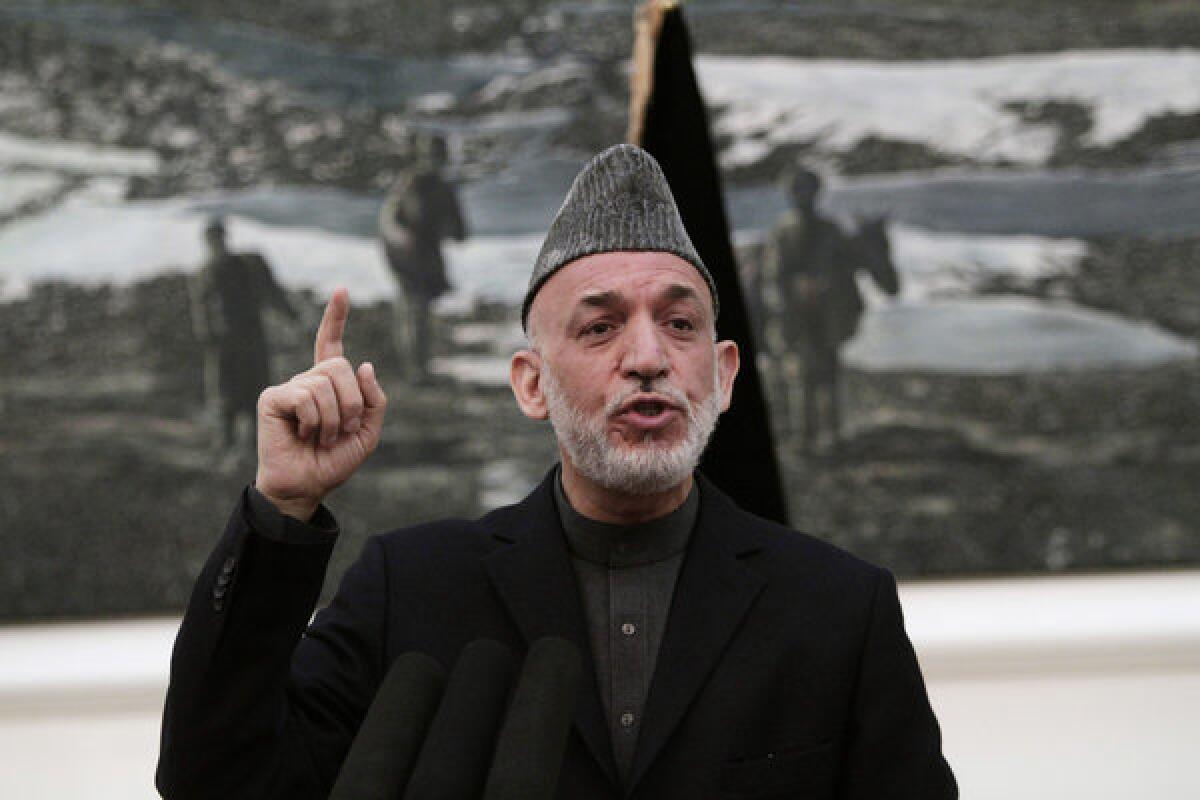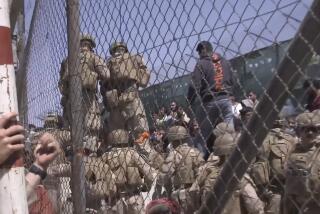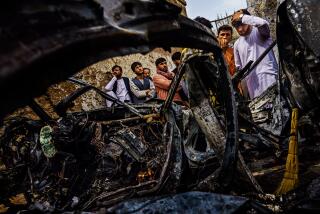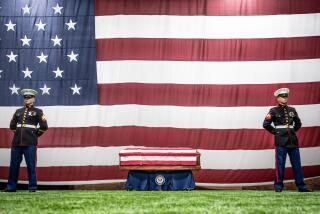Five American soldiers killed by roadside bomb in Afghanistan

KABUL, Afghanistan -- Five American soldiers were killed in southern Afghanistan on Saturday when their vehicle hit a roadside bomb, officials said.
The powerful explosion took place about 2 p.m. when an American armored vehicle hit the device in the Maiwand district of southern Kandahar province as it was heading back to its base, said Jawed Faisal, a spokesman for the governor of Kandahar province.
John Manley, a spokesperson for the U.S.-led coalition in Kabul, confirmed that all five were Americans.
The attack came as Afghan President Hamid Karzai conceded that his government has received funding from the CIA for over a decade as part of its regular payments from the United States.
There was no immediate claim of responsibility for Saturdayâs bombing, although it fits the strike pattern of the Taliban, which launched its spring offensive a week ago, vowing to target foreign military bases and diplomatic districts.
The attack followed the death of three British soldiers in a roadside bombing Tuesday in southern Helmand province as they drove in what was reportedly a Mastiff troop carrier, a 15-ton vehicle seen as one of the safest operated by the British military.
The U.S. and its NATO allies have worked hard to reduce their exposure to deadly roadside bombs -- known as improvised explosive devices, or IEDs -- issuing heavily armored military vehicles, radio technology designed to explode devices preemptively and night-vision cameras and goggles to detect those planting the bombs in real time.
But insurgents have countered these efforts with bigger versions of these effective, low-tech weapons, which are often made of little more than fertilizer stuffed into a container and affixed with a cellphone or a primitive timer device. Roadside bombs remain the biggest killers of international forces in Afghanistan since the 2001 U.S. invasion.
Karzaiâs disclosure at a news conference in Kabul of ongoing CIA funding comes at a time of growing tension between Washington and his government over civilian deaths, the nature of U.S. assistance after most Western troops leave in 2014 and inflammatory statements by the Afghan president that the Obama administration has colluded with the Taliban insurgency.
On Friday, U.S. Secretary of State John F. Kerry named James Dobbins as the new U.S. special envoy to Afghanistan and Pakistan in a bid to ease tensions and âbring the conflict to a peaceful conclusion.â
Karzai told reporters Saturday that the CIA station chief in Kabul assured him that regular CIA funding will not be cut off. The news follows a report in the New York Times that the CIA has paid the Afghan National Security Council tens of millions of dollars in monthly installments over several years, delivered in backpacks, suitcases and plastic shopping bags.
Karzai acknowledged said the payments started before there was a viable administration in Afghanistan and carried on as state institutions were built.
âThat is state-to-state, government-to-government regular assistance,â Karzai said. âAll this assistance is very useful for us. We have spent it in different areas [and] solved lots of our problems.â
Karzai declined to say how much money was involved, citing the importance of secrecy in intelligence work. But he said all funds have been accounted for with receipts âsent back to the intelligence service of the United States monthly,â with much of the money used for operational expenses, housing, youth scholarships and to care for wounded employees of Afghanistanâs intelligence agency, the National Directorate of Security.
Afghanistan has seen numerous corruption scandals involving banking, real estate, drug trafficking, mining and contraband cigarettes, among others.
During his news conference at the presidential palace, Karzai said heâd met earlier that day with the CIAâs Kabul station chief.
âI told him because of all these rumors in the media, please do not cut all this money because we really need it,â Karzai said. âWe want to continue this sort of assistance.â
Karzai also said there was no agreement yet on a U.S.-Afghan security accord after six months of negotiations because of conditions Kabul was placing on such a deal. The terms Afghanistan is reportedly insisting on include specific foreign levels of funding, training and equipping Afghan forces and a requirement that U.S. troops be subject to Afghan law. Immunity for American troops is a standard part of the so-called Status of Forces agreements that Washington signs with countries hosting its military bases.
âWe are trying our best that the security of Afghanistan should be guaranteed, peace in Afghanistan should be guaranteed, a strengthening of the Afghan security forces should be guaranteed, as well the economy of Afghanistan should be guaranteed,â Karzai said.
Kabul is particularly concerned with its security along the porous border between Afghanistanâs restive eastern provinces and Pakistanâs lawless northeast tribal areas.
The two dispute the location of the border. Kabul refuses to accept the Durand Line, the 19th century separation between present-day Afghanistan and Pakistan, while Pakistan does.
âNo government in Afghanistan will accept the Durand Line,â Karzai said.
ALSO:
Israel reportedly carries out airstrike against Syria
Remains found at U.S. plane crash site in Kyrgyzstan
Obama declares ground troops not being considered for Syria
Special correspondent Baktash reported from Kabul and Times staff writer Magnier from Kolkata, India.
More to Read
Sign up for Essential California
The most important California stories and recommendations in your inbox every morning.
You may occasionally receive promotional content from the Los Angeles Times.










